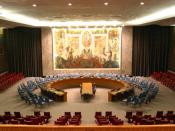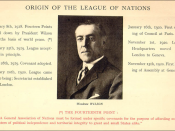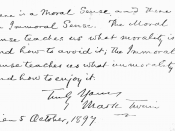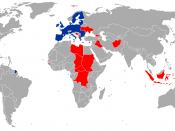Throughout the pages of history, several institutions have been created to "preserve" peace, tranquility and fairness in the global scheme of things. Both the League of Nations and its successor, the United Nations have seen immoral atrocities committed around the world and have failed to act due to what some people might refer to as a "conflict of interest" or overstepping boundaries. Many countries have continued to act in their own interests and have caused major damage and suffering to other nations without merely being challenged by the international scene. But the real confrontation is: "What can you consider internationally moral or immoral?" Under what moral grounds can a country be judged? Through several readings and dialogues, it is clear that there is practically no place for morality amid international affairs due to the natural flaws of man, the universal human notion of greed and sheer profitable interests of nations.
"The argument starts with the observation that man as an actor on the political scene does certain things in violation of ethical principle which he does not do when he acts in a private capacity (Morgenthau 7)." The actions of politicians are in many cases outlined by their personal interests and their supreme recklessness, due to the fact that at the end of the day their countries, and not them, have to deal with the consequences. Morality, in the political scene seems to be judged with other standards than morality in the personal or private landscape. Since men will in many cases act in their own interest, rather than in the interest of the community, it is impossible for moral standards to be followed within the international society.
As Aristotle perfectly addresses it, "the greatest crimes are caused by excess and not by necessity." The excess of land, money, and especially power, make the political scene a stage for immoral actions that consciously or not, cause turmoil amid the international arena. The search for political power has driven nations to abuse what the international scene at times has considered logical and moral. Some nations confuse or try to disguise humanitarian intervention with the sheer hunger of a nations growth or imperialistic ideals. As Michael Walther cleverly explains it in "Just and Unjust Wars", Spain's invasion in Cuba from 1898 to 1902 can be considered an example of benevolent imperialism but not an action of humanitarian intervention. United States role can't also be considered a humanitarian intervention since the political power it gained from the action was without a doubt a political power move. Without a doubt, greed drives politicians and nations to act in an immoral way, paving the road for corruption and stripping away moral rights from the international landscape.
Every nation and every human being is without a doubt going to act with their best interest in mind, especially when it comes to political situations. The homogeneous, yet sometimes diverse, interests of nations will cause them to act in a particular way, without regarding for the well being of others; and how can a nation be blamed or judged "immoral" for wanting the same thing other nations want?As Professor George F Kennan tries to explain: If the policies and actions of a certain country are to be made to conform moral standards, those standards are going to have to be the country's own, founded on their traditional principles of justice and propriety. When others fail to conform to those principles, and when their failure to conform has an adverse effect on the countries interests, as distinct from political tastes, they have every right to complain and, if necessary, to take retaliatory action. What a nation cannot do is to assume that their moral standards are the same as others', and to appeal to those standards as the source of their grievances.
As the readings try to explain, man itself is corrupt, greedy and immoral amid the political scene. Nations will act in their best interest and what is moral for a nation is not necessarily moral for another. Ultimately there is no role for morality in international affairs, as it is a paradigm of Darwinism. How can you morally judge an action, when every culture is different, and everyone is trying to achieve his or her interests?Workshttp://www.religion-online.org/showarticle.asp?title=1170http://www.allacademic.com/meta/p_mla_apa_research_citation/0/8/8/8/2/p88828_index.html





